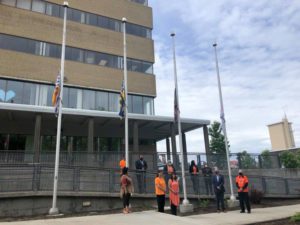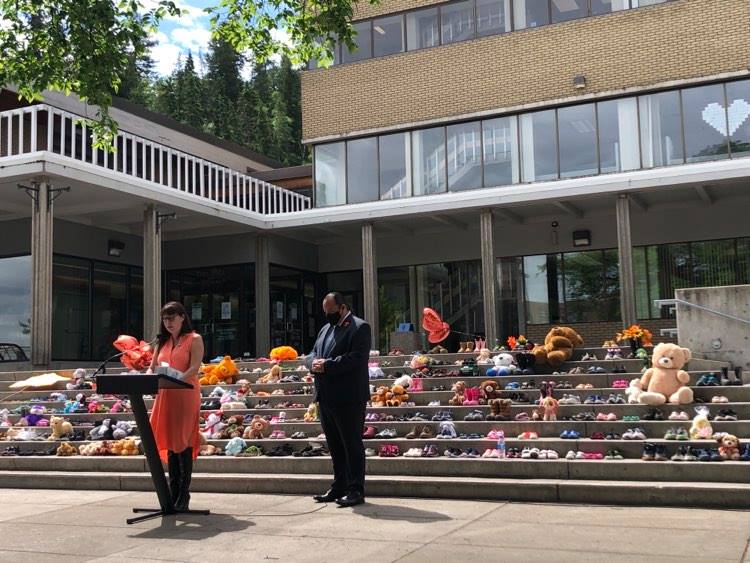
Chief of Lheidli T’enneh, Dolleen Logan was joined by fellow council members and Mayor Lyn Hall to lower the Lheidli T’enneh flag in honour of the remains of 215 children found at the Residential School in Kamloops.
The flag won’t be raised again until January 2nd, 2022, which is 215 days from now, one day to honour each child found.
During the ceremony, Chief Logan was joined by fellow Lheidli T’enneh Council members to discuss their experiences with residential schools.
“I’ve heard some of what happened to my mum, my aunts, my uncles and our friends. They are the true survivors. They are the ones that made it home when so many didn’t,” Chief Logan said through tears.
Chief Logan is now calling on the federal government to utilize the ground-penetrating technology used in Kamloops at all residential school sites.
Meanwhile, Elder Darlene McIntosh joined in and spoke on the intergenerational trauma created throughout Canada’s history that she says Indigenous people continue to battle.
“When our people expressed what had happened to our children we were scorned… Do you believe us now?” said Darlene McIntosh.
Councilor Crystal Gibbs and Councilor Helen Buzas both tearfully reflected on their family ties with residential schools.
Gibbs noted how important it is that Indigenous people continue to celebrate their culture even after overcoming an experience as traumatic as residential schooling.
“It’s very important to continue to reach our children and grandchildren to be proud of who they are. They need to have the ability to overcome and rise above the history that tried to erase them,” she added.
Councillor Dominic Frederick has first-hand experience in the residential school system, along with his wife, Shirley.
He says this discovery only shows how important it is for Indigenous voices to be amplified in Canada.
“We need to develop a plan so this never happens again. We don’t want history to repeat itself because if we don’t do something it will repeat itself,” said Frederick.
Joe Gosnell, Executive Director at Lheidli T’enneh attended a residential school as well, he says the grounds of Lejac need to be considered a crime scene, along with all other historical residential school grounds in Canada.
Councillor Joshua Seymour reminded residents that residential schools are still a prominent part of Canada’s recent history.
“The last residential school closed in 1996, many of us could’ve attended those schools,” he added.
Seymour’s parents, aunts and uncles are all survivors of the residential school system.
Additionally, Councilor Marcel Gagnon spoke about his older brother’s first-hand experiences at Lejac and described how students were starved to the point where they willingly ate raw chicken knowing it could make them very sick.
Chief Logan is urging residents to continue the conversation about residential schools, and have open conversations with friends and family members.
Something going on in the Prince George area you think people should know about?
Send us a news tip by emailing [email protected].







